Filter by
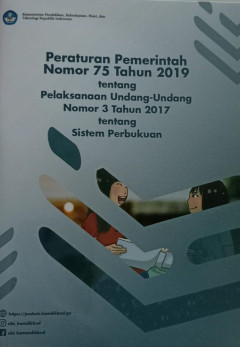
Peraturan Pemerintah Nomor 75 Tahun 2019
- Edition
- -
- ISBN/ISSN
- -
- Collation
- 15cm X 10,5cm
- Series Title
- Pedoman
- Call Number
- 349.99523PEM
- Edition
- -
- ISBN/ISSN
- -
- Collation
- 15cm X 10,5cm
- Series Title
- Pedoman
- Call Number
- 349.99523PEM

Peraturan Kepala Badan Standar, Kurikulum, dan Asesmen Pendidikan Nomor 030/P…
- Edition
- -
- ISBN/ISSN
- -
- Collation
- 15cm X 10,5cm
- Series Title
- Pedoman
- Call Number
- 020.32PER
- Edition
- -
- ISBN/ISSN
- -
- Collation
- 15cm X 10,5cm
- Series Title
- Pedoman
- Call Number
- 020.32PER
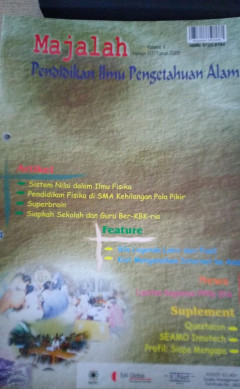
Majalah Pendidikan Ilmu Pengetahuan Alam
Majalah Pendidikan Ilmu Pengetahuan Alam merupakan terbitan berkala yang memuat artikel-artikel ilmiah seputar pembelajaran dan pengembangan ilmu pengetahuan alam di dunia pendidikan. Majalah ini menjadi wadah bagi guru, dosen, peneliti, dan praktisi pendidikan untuk menyampaikan hasil penelitian, kajian teoritis, serta inovasi pembelajaran yang relevan dengan kurikulum IPA.
- Edition
- Volume V Nomor 117
- ISBN/ISSN
- 0125-9784
- Collation
- 29 cm x 21 cm
- Series Title
- Majalah Volume V Nomor 117/Tahun 2005
- Call Number
- 507.05 MAJ

Undang-Undang Nomor 3 Tahun 2017 tentang Sistem Perbukuan
- Edition
- -
- ISBN/ISSN
- -
- Collation
- 15cm X 10,5cm
- Series Title
- Pedoman
- Call Number
- 349.99523UND
- Edition
- -
- ISBN/ISSN
- -
- Collation
- 15cm X 10,5cm
- Series Title
- Pedoman
- Call Number
- 349.99523UND

Peraturan Menteri Pendidikan Kebudayaan, Riset, dan Teknologi Nomor 22 Tahun …
- Edition
- -
- ISBN/ISSN
- -
- Collation
- 15cm X 10,5cm
- Series Title
- Pedoman
- Call Number
- 349.99523PER
- Edition
- -
- ISBN/ISSN
- -
- Collation
- 15cm X 10,5cm
- Series Title
- Pedoman
- Call Number
- 349.99523PER
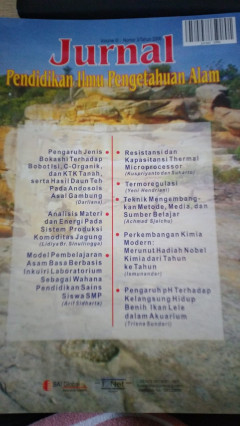
Jurnal Pendidikan Ilmu Pengetahuan Alam
Volume III Nomor 3 Tahun 2006 dari Jurnal Pendidikan Ilmu Pengetahuan Alam memuat sejumlah artikel hasil penelitian dan kajian teoretis yang berfokus pada peningkatan kualitas pembelajaran IPA di berbagai jenjang pendidikan. Artikel-artikel dalam edisi ini membahas strategi pembelajaran inovatif seperti pendekatan konstruktivistik, penggunaan media eksperimen, serta integrasi teknologi dalam pe…
- Edition
- Volume III Nomor 3
- ISBN/ISSN
- -
- Collation
- 30 cm x 21 cm
- Series Title
- Volume III Nomor 3/Tahun 2006
- Call Number
- 5071 Jur

I Still Have Pne Leg
I Still Have One Leg adalah kumpulan puisi dan refleksi pribadi oleh Chou Ta‑Kuan, seorang anak penyintas kanker yang menampilkan perjuangannya dalam mempertahankan semangat hidup meski kehilangan satu kaki. Dalam karya ini, Ta‑Kuan menyampaikan pesan keberanian, harapan, dan makna kehidupan melalui metafora fisik dan emosional tentang ketidaksempurnaan tubuh dan semangat yang tetap utuh.
- Edition
- -
- ISBN/ISSN
- 957-97952-2-3
- Collation
- 21 cm x 20 cm
- Series Title
- -
- Call Number
- 920TAU

Nayna Bermain Sepeda
Buku ini merupakan cerita bergambar untuk anak-anak yang dirancang sebagai media pembelajaran untuk mengembangkan stimulasi motorik dan sosial. Dalam cerita, tokoh Nayna memulai petualangan baru bertemu teman baru dan belajar naik sepeda.
- Edition
- -
- ISBN/ISSN
- 978-602-72058-5-7
- Collation
- 27 cm x 15 cm
- Series Title
- -
- Call Number
- 813 NAY

Peraturan Kepala Badan Standar,dan Asesmen Pendidikan Nomor 039/H/P/2022
Peraturan ini menetapkan pedoman teknis untuk pelaksanaan penilaian buku pendidikan, yang mencakup buku teks pelajaran, buku pengayaan, dan buku panduan pendidik. Penilaian bertujuan menjamin kualitas isi, kebahasaan, penyajian, dan kegrafikaan buku sesuai dengan standar nasional pendidikan.
- Edition
- -
- ISBN/ISSN
- -
- Collation
- 14,5 cm x 10 cm
- Series Title
- -
- Call Number
- 002 KEP

Peraturan Menteri Penddikan,Kebudayaan,Riset,dan Teknologi Nomor 25 Tahun 2022
Peraturan ini mengatur tata cara penilaian buku pendidikan untuk memastikan mutu, relevansi, dan kesesuaian buku dengan standar pendidikan nasional. Penilaian dilakukan terhadap buku teks pelajaran, buku pengayaan, dan buku panduan pendidik untuk jenjang pendidikan dasar dan menengah.
- Edition
- -
- ISBN/ISSN
- -
- Collation
- 14,5 cm x 10 cm
- Series Title
- -
- Call Number
- 002 PER

1001 Series Topical Questions
1001 Series Topical Questions menyajikan kumpulan pertanyaan topikal yang dirancang untuk merangsang diskusi, refleksi, dan interaksi dalam berbagai konteks—baik edukatif, sosial, maupun interpersonal. Pertanyaan-pertanyaan ini terbagi menurut kategori tema umum seperti tren sosial, pengalaman pribadi, preferensi, imajinasi, dan isu kontemporer.
- Edition
- -
- ISBN/ISSN
- 978-967-5051-77-7
- Collation
- 27cm X 21cm
- Series Title
- -
- Call Number
- 371.33SCI
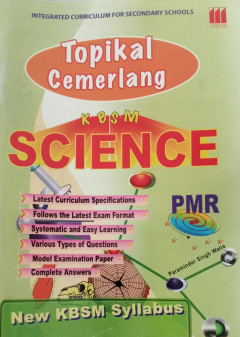
Topikal Cemerlang KBSM SCIENCE
Buku Topikal Cemerlang KBSM Science merupakan buku latihan sains berbentuk topikal yang dirancang sesuai dengan struktur dan tema dalam buku teks KBSM. Ditujukan untuk pelajar sekolah menengah
- Edition
- -
- ISBN/ISSN
- 978-983-3864-87-4
- Collation
- 25cm X 18cm
- Series Title
- -
- Call Number
- 371.33TOP

Melukis Wajah Pendidikan Indonesia (Kiat Sukses Implementasi Kurikulum 2013)
Buku Melukis Wajah Pendidikan Indonesia menyajikan panduan strategis dan reflektif untuk implementasi Kurikulum 2013. Ditujukan bagi para guru, kepala sekolah, dan pemangku kepentingan pendidikan
- Edition
- -
- ISBN/ISSN
- 978-602-7629-85-1
- Collation
- 20,5cm X 14cm
- Series Title
- -
- Call Number
- 375MEL
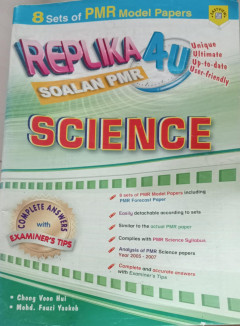
Replika 4U Soalan PMR Science
Buku Replika 4U Soalan PMR Science disusun khusus untuk membantu pelajar tingkat menengah mempersiapkan diri menghadapi ujian PMR (Penilaian Menengah Rendah) dalam mata pelajaran Sains.
- Edition
- -
- ISBN/ISSN
- 978-967-303-142-9
- Collation
- 28 cm x 20 cm
- Series Title
- -
- Call Number
- 507.6 REP

Multitest Question Bank 1500 Science
Buku Multitest Question Bank merupakan kumpulan soal-soal latihan yang dirancang untuk membantu peserta didik mempersiapkan diri menghadapi berbagai jenis ujian, baik ujian sekolah, ujian masuk perguruan tinggi, maupun tes standar lainnya.
- Edition
- -
- ISBN/ISSN
- 978-967-5101-00-7
- Collation
- 27 cm x 21 cm
- Series Title
- -
- Call Number
- 371.26 SCI
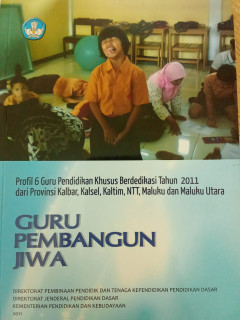
Guru Pembangun Jiwa
Buku Guru Pembangun Jiwa menyoroti peran mendalam seorang guru tidak hanya sebagai pengajar, tetapi juga sebagai pembimbing, pembentuk karakter, dan penjaga nilai-nilai kemanusiaan dalam diri siswa.
- Edition
- -
- ISBN/ISSN
- -
- Collation
- 20 cm x 15 cm
- Series Title
- -
- Call Number
- 371.1 JIW
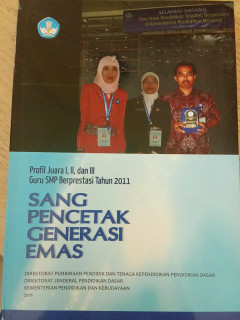
Sang Pencetak Generasi Emas
Buku Sang Pencetak Generasi Emas mengangkat kisah dan peran inspiratif para pendidik dalam membentuk generasi masa depan yang unggul, berkarakter, dan berdaya saing tinggi.
- Edition
- -
- ISBN/ISSN
- -
- Collation
- 20 cm x 15 cm
- Series Title
- -
- Call Number
- 371.1SAN
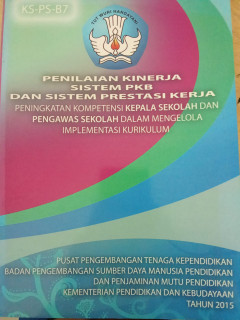
Penilaian Kinerja Sistem PKB dan Sistem Presentasi Kerja
Buku Penilaian Kinerja Sistem PKB dan Sistem Presentasi Kerja membahas secara komprehensif konsep, indikator, dan mekanisme evaluasi kinerja guru dalam kerangka Pengembangan Keprofesian Berkelanjutan (PKB). Buku ini mengulas bagaimana sistem penilaian dirancang untuk mendorong peningkatan kompetensi pedagogik, profesional, sosial, dan kepribadian guru.
- Edition
- -
- ISBN/ISSN
- -
- Collation
- 29 cm x 20 cm
- Series Title
- -
- Call Number
- 371.144 PEN

Prof. Dr. Baedhowi, M.Si
Buku ini berisikan menganai riwayat hidup dan karier Prof. Dr. Baedhowi, M.Si sebagai Dirjen PMPTK Depdiknas tahun 2007 s.d. 2009
- Edition
- Pertama
- ISBN/ISSN
- 978-602-95503-0-6
- Collation
- 234 hal; 15 x 23 x 2 cm
- Series Title
- -
- Call Number
- 650 M
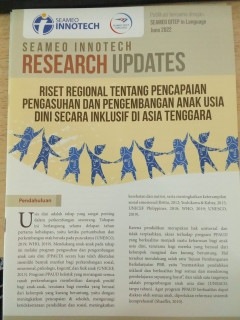
Research Updates Riset Regional(Majalah)
Buku Riset Regional membahas berbagai pendekatan dan temuan penelitian yang berfokus pada dinamika sosial, ekonomi, budaya, dan lingkungan di tingkat regional atau kewilayahan. Buku ini menyajikan hasil studi empiris dan analisis kebijakan yang menggambarkan kondisi dan potensi wilayah tertentu, termasuk isu-isu pembangunan daerah, ketimpangan antarwilayah, serta strategi perencanaan dan pengel…
- Edition
- -
- ISBN/ISSN
- -
- Collation
- 29 cm x 21 cm
- Series Title
- -
- Call Number
- 001.4 RIS
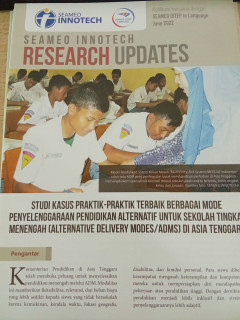
Research Updates (Majalah)
Research Updates merupakan publikasi ilmiah berkala yang menyajikan informasi terbaru mengenai berbagai hasil penelitian dari beragam disiplin ilmu. Tujuan utama dari publikasi ini adalah menyebarluaskan temuan-temuan mutakhir yang memiliki relevansi akademik dan praktis, serta memberikan wawasan baru bagi para peneliti, pendidik, mahasiswa, dan pengambil kebijakan
- Edition
- -
- ISBN/ISSN
- -
- Collation
- 29 cm x 20 cm
- Series Title
- -
- Call Number
- 001. 4 RES
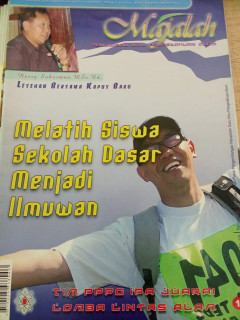
Melatih Siswa Sekolah Dasar Menjadi Ilmuwan(Majalah)
Buku Melatih Siswa Sekolah Dasar Menjadi Ilmuwan dirancang untuk membekali guru dan pendidik dengan pendekatan, strategi, dan aktivitas pembelajaran yang dapat menumbuhkan pola pikir ilmiah sejak usia dini. Melalui pendekatan berbasis inkuiri, observasi, eksperimen sederhana, dan pemecahan masalah, buku ini mengajarkan bagaimana mengembangkan keterampilan proses sains seperti mengamati, mengelo…
- Edition
- Volume VI No 118
- ISBN/ISSN
- -
- Collation
- 30 cm x 21 cm
- Series Title
- Volume VI No 118 Tahun 2006
- Call Number
- 507.1 MEL

Apa Yang Harus Dilakukan Guru?
Buku Apa Harus Dilakukan Guru menyajikan panduan praktis dan reflektif mengenai peran, tanggung jawab, dan strategi yang perlu dijalankan oleh guru dalam menjalankan tugas profesionalnya. Buku ini membahas berbagai aspek penting dalam profesi keguruan, mulai dari perencanaan pembelajaran, manajemen kelas, penilaian hasil belajar, hingga pembentukan karakter siswa. Selain itu, buku ini menyoroti…
- Edition
- Volume VII No 119
- ISBN/ISSN
- 0125-9784
- Collation
- 28 cm x 21 cm
- Series Title
- Volume VII No 119 Tahun 2007
- Call Number
- 371.1 ALA

Mengukir Guru IPA di Indonesia
Majalah Mengukir Guru IPA di Indonesia menyajikan refleksi mendalam mengenai pembangunan profesionalisme guru IPA melalui pendekatan pedagogik, kecakapan instruksional, dan penguatan sikap keilmuan. Setiap edisi berisi kumpulan artikel
- Edition
- -
- ISBN/ISSN
- -
- Collation
- 23,5cm X 15,5cm
- Series Title
- Majalah
- Call Number
- 371.1MEN
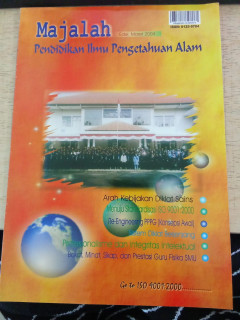
Majalah Ilmu Pengetahuan Alam
Buku Ini berisi Tentang Arah Kebijakan Sains,Bakat Minat Sikap dan Prestasi Guru Fisika SMU
- Edition
- Edisi Maret 2004
- ISBN/ISSN
- 0125-9784
- Collation
- 29 cm x 21 cm
- Series Title
- -
- Call Number
- 507.105 PEN
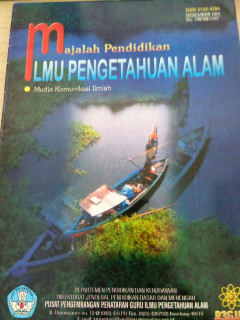
Majalah Pendidikan Ilmu Pengetahuan Alam
Majalah Pendidikan Ilmu Pengetahuan Alam adalah terbitan berkala yang memuat artikel ilmiah, laporan penelitian, dan praktik pembelajaran inovatif dalam bidang pendidikan sains. Fokus utama majalah ini adalah pengembangan metode pengajaran IPA, penggunaan media pembelajaran, evaluasi pembelajaran, dan integrasi teknologi dalam pengajaran sains di tingkat pendidikan dasar dan menengah.
- Edition
- No 180 XII
- ISBN/ISSN
- 0125-9784
- Collation
- 29 cm x 21 cm
- Series Title
- No 180/XXI/1997
- Call Number
- 507.105 MAJ

Pengembangan Alat Peraga IPA Dalam Pembelajaran
Majalah Pengembangan Alat Peraga IPA dalam Pembelajaran menyoroti inovasi dan praktik dalam desain serta pemanfaatan alat peraga sebagai media pembelajaran IPA.
- Edition
- -
- ISBN/ISSN
- -
- Collation
- 23,5cm X 15,5cm
- Series Title
- Majalah
- Call Number
- 371.33PEN
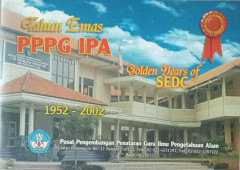
Tahun Emas PPPG IPA (Golden Years of SEDC)
Majalah Tahun Emas PPPG IPA mencerminkan perjalanan historis dan pencapaian penting dalam pengembangan pendidikan IPA oleh SEDC (Science Education Development Center) selama “Golden Years” organisasi. Edisi ini menyajikan narasi retrospektif yang menyatukan elemen sejarah, evaluasi program, dan potret transformasi edukatif komprehensif.
- Edition
- -
- ISBN/ISSN
- -
- Collation
- 17cm X 24cm
- Series Title
- Majalah
- Call Number
- 507.078GOL

Pengembangan,Implementasi,dan Review Kurikulum IPA pada Pendidikan Dasar dan …
Buku ini membahas secara komprehensif proses pengembangan, implementasi, dan evaluasi kurikulum Ilmu Pengetahuan Alam (IPA) pada jenjang pendidikan dasar dan menengah.
- Edition
- Edisi Tahun 1999-2000
- ISBN/ISSN
- 0125-9784
- Collation
- 29 cm x 21 cm
- Series Title
- -
- Call Number
- 375.00507 MAJ

Pendidikan Ilmu Pengetahuan Alam (Media Komunikasi Dalam Pendidikan IPA)
Majalah Pendidikan Ilmu Pengetahuan Alam membahas peran media komunikasi (baik cetak maupun digital) dalam mendukung pembelajaran IPA di lingkungan sekolah dasar hingga menengah. Fokus utamanya adalah pada pengembangan media interaktif—seperti majalah ilmiah, komik digital, animasi, dan modul berbasis ICT—yang dirancang untuk meningkatkan literasi sains, keterampilan komunikasi ilmiah, dan …
- Edition
- -
- ISBN/ISSN
- -
- Collation
- 21,5cm X 14,5cm
- Series Title
- Majalah
- Call Number
- 507.8RDA
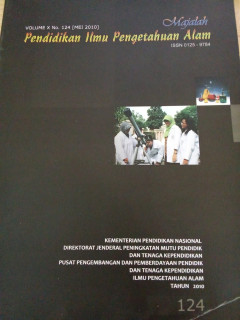
Ilmu Pengetahuan Alam(Majalah)
Majalah Pendidikan Ilmu Pengetahuan Alam merupakan terbitan berkala yang menyajikan artikel-artikel ilmiah, hasil penelitian, dan praktik pembelajaran inovatif di bidang pendidikan sains.
- Edition
- Volume X No 124
- ISBN/ISSN
- 0125-9784
- Collation
- 29 cm x 21 cm
- Series Title
- Volume X No 124/Mei 2010
- Call Number
- 507.105 PEN
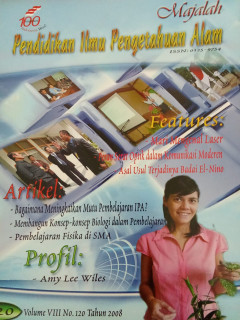
Pendidikan Ilmu Pengetahuan Alam (Majalah)
Buku ini Berisi Tentang Mengenal laser,peran serat optik komunikasi modern,dan asal usul terjadinya badai El-Nino
- Edition
- Volume VIII No 120
- ISBN/ISSN
- 0125-9784
- Collation
- 27 cm x 21 cm
- Series Title
- Volume VIII No 120/Tahun 2008
- Call Number
- 507.1 iLM

Sistem Pertahanan Tubuh Terhadap Senyawa Patogen(Pendidikan Biologi)
Buku Sistem Pertahanan Tubuh terhadap Senyawa Patogen disusun sebagai bahan ajar dalam pendidikan biologi yang membahas mekanisme pertahanan tubuh organisme terhadap ancaman biologis seperti bakteri, virus, jamur, dan zat asing lainnya.
- Edition
- Volume X No 125
- ISBN/ISSN
- 0125-9784
- Collation
- 28 cm x 29 cm
- Series Title
- Volume X No 125/Agustus 2010
- Call Number
- 571.96 SEN
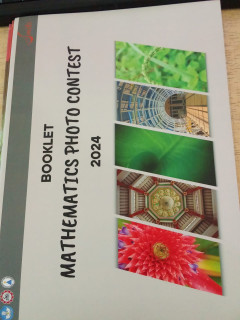
Booklet Mathematics Photo Contest 2024
Booklet Mathematics Photo Contest 2024 merupakan kumpulan dokumentasi hasil karya peserta lomba fotografi yang diselenggarakan oleh SEAMEO QITEP in Mathematics. Lomba ini bertujuan untuk menumbuhkan kesadaran bahwa konsep matematika hadir secara nyata dan aplikatif dalam kehidupan sehari-hari. Melalui pendekatan visual, para peserta menangkap berbagai objek, situasi, dan pola yang merepresentas…
- Edition
- -
- ISBN/ISSN
- -
- Collation
- 20 cm x 29 cm
- Series Title
- -
- Call Number
- 510.71 BOO
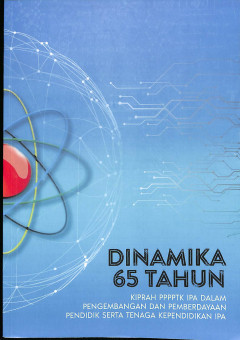
Dinamika 65 Tahun Kiprah PPPPTK IPA dalam Pengembangan dan Pemberdayaan Pendi…
Buku ini berisi perjalanan dan kiprah PPPPTK IPA selama 65 tahun semenjak dibentuk dalam memberdayakan guru-guru IPA se Indonesia.
- Edition
- KEDUA
- ISBN/ISSN
- -
- Collation
- 256 hal; 17 x 25 cm
- Series Title
- -
- Call Number
- 920 DIN
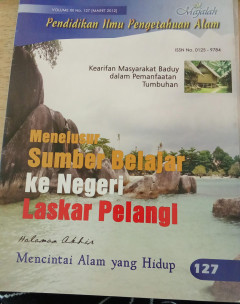
Pendidikan Ilmu Pengetahuan Alam (Majalah)
Majalah Pendidikan Ilmu Pengetahuan Alam menyajikan berbagai artikel ilmiah dan kajian praktis yang membahas pengembangan pembelajaran sains di jenjang pendidikan dasar dan menengah. Fokus utama majalah ini meliputi strategi pengajaran inovatif, pengembangan kurikulum IPA, integrasi teknologi dalam pembelajaran sains, serta hasil penelitian empiris di bidang pendidikan IPA. Diharapkan, majalah …
- Edition
- Volume XII No 127
- ISBN/ISSN
- 0125-9784
- Collation
- 28,5 cm x 21 cm
- Series Title
- Majalah Volume XII No 127/Maret 2012
- Call Number
- 507.1 PEN

Sistem Pertahanan Tubuh Terhadap Senyawa Patogen (Pendidikan Biologi)
Buku ini membahas secara komprehensif mekanisme sistem pertahanan tubuh manusia dalam melawan berbagai senyawa patogen seperti bakteri, virus, jamur, dan toksin. Dimulai dari pengenalan struktur dan fungsi komponen sistem imun, baik imun bawaan (non-spesifik) maupun imun adaptif (spesifik), buku ini juga mengulas proses deteksi patogen, respon imun seluler dan humoral, serta peran sel-sel imun …
- Edition
- Volume X No 125
- ISBN/ISSN
- 0125-9784
- Collation
- 21 cm x 29 cm
- Series Title
- Volume X No 125/Agustus 2010
- Call Number
- 616.079 SIS
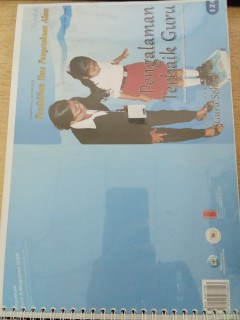
Pengalaman Terbaik Guru
Buku Pengalaman Terbaik Guru memuat kisah-kisah inspiratif dari para pendidik yang membagikan pengalaman berharga selama menjalankan tugas sebagai guru. Setiap cerita mencerminkan tantangan, keberhasilan, dan pembelajaran yang mereka alami dalam proses mendidik, membimbing, dan membentuk karakter siswa.
- Edition
- Volume X No 124
- ISBN/ISSN
- 0125-9784
- Collation
- 29 cm x 21 cm
- Series Title
- Volume X No 124/Mei 2010
- Call Number
- 371.1 GUR

PROSIDING SEMINAR INTERNASIONAL : SCIENCE, TECHNOLOGY, ENGINEERING, AND MATH…
- Edition
- -
- ISBN/ISSN
- -
- Collation
- 25cm X 18cm
- Series Title
- -
- Call Number
- 098PRO
- Edition
- -
- ISBN/ISSN
- -
- Collation
- 25cm X 18cm
- Series Title
- -
- Call Number
- 098PRO

PROSIDING SEMINAR INTERNASIONAL : INQUIRY BASED LEARNING
- Edition
- -
- ISBN/ISSN
- -
- Collation
- 25cm X 18cm
- Series Title
- -
- Call Number
- 098PRO
- Edition
- -
- ISBN/ISSN
- -
- Collation
- 25cm X 18cm
- Series Title
- -
- Call Number
- 098PRO
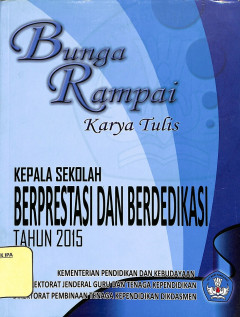
Bunga Rampai Karya Tulis KEPALA SEKOLAH BERPRESTASI DAN BEREDIKASI TAHUN 2015
A. Untuk menyelesaikan berbagai persoalan diperlukan langkah kerja yang cerdas. yaitu mengoptimalkan pemenfaatan otak untuk mencari solusi yang tepat. B.Untuk mewujudkan langkah kerja cerdas tersebut diperlukan kerja keras. Langkah cerdas yang tidak disertai kerja keras maka tidak aka nada manfaatnya. C. Dalam menyelesaikan setiap persoalan harus dilakukan sampai tuntas. Artinya setiap…
- Edition
- -
- ISBN/ISSN
- -
- Collation
- 22 x 17 cm
- Series Title
- -
- Call Number
- 098 BUN

Panduan Teknis Perawatan Peralatan Laboratorium Komputer & Multimedia
- Edition
- -
- ISBN/ISSN
- -
- Collation
- 21cm X 14,5cm
- Series Title
- Pedoman
- Call Number
- 621.39PAN
- Edition
- -
- ISBN/ISSN
- -
- Collation
- 21cm X 14,5cm
- Series Title
- Pedoman
- Call Number
- 621.39PAN
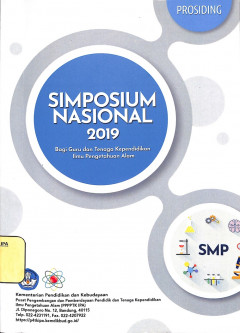
simposium nasional 2019 bagi guru dan tenaga kependidikan ilmu pengetahuan SMP
Penugasan pencarian ayat-ayat Alqur'an pada materi pewarisan sifat, dapat menguatkan karakter religius siswa yang tampak dari beberapa perubahan sikap, yaitu: a Ketika berdoa sebelum dan sesudah pelajaran, siswa terlihat lebih serius dan khusu', termasuk ketika membaca surat pendek/ayat pilihan (sesuai jadwal). b. Ketika mendapatkan jadwal sholat dhuha dan sholat zuhur berjamaah, seba…
- Edition
- -
- ISBN/ISSN
- -
- Collation
- 25.5 x 17.8 cm
- Series Title
- -
- Call Number
- 507.2SIM

Pembudayaan Kegemaran Membaca (PEDOMAN)
Pedoman ini memberikan panduan komprehensif dalam membudayakan kegemaran membaca di berbagai lingkungan — yaitu keluarga, sekolah, masyarakat, dan perpustakaan. Tujuannya adalah memperkuat literasi nasional dan mendukung kecerdasan bangsa sesuai amanat Undang‑Undang No. 43 Tahun 2007 tentang Perpustakaan, khususnya Pasal 48 yang menekankan peran sinergi antara tiga pilar edukasi. Dokume…
- Edition
- -
- ISBN/ISSN
- 978-602-9343-00-7
- Collation
- 25cm X 18cm
- Series Title
- Pedoman
- Call Number
- 028.9PEM

PETUNJUK TEKNIS (Program Pengembangan Keprofesian Berkelanjutan)
Pedoman ini menyajikan instrumen teknis pelaksanaan Program PKB melalui pendekatan zonasi guna meningkatkan mutu pembelajaran di Indonesia. Tujuan utamanya adalah mendukung kualitas proses belajar mengajar melalui Program PKP yang berorientasi pada keterampilan berpikir tingkat tinggi (HOTS), serta pemerataan mutu pendidikan secara regional. Strategi zonasi diterapkan melalui pengelolaan lembag…
- Edition
- -
- ISBN/ISSN
- -
- Collation
- 29cm X 20,5cm
- Series Title
- Pedoman
- Call Number
- 375.001PET

Library Catalog 2007-2008
Buku ini merupakan katalog bibliografis yang diterbitkan oleh Library of Congress untuk mendokumentasikan koleksi buku, jurnal, dan bahan pustaka lainnya yang diterima atau diklasifikasikan selama tahun 2007 hingga 2008. Katalog ini disusun berdasarkan sistem klasifikasi dan pengindeksan tematik, serta mencakup entri lengkap dengan informasi bibliografi, subjek, dan nomor klasifikasi.
- Edition
- -
- ISBN/ISSN
- -
- Collation
- 20 cm x 29 cm
- Series Title
- Katalog
- Call Number
- 025.3

Katalog ECO PRINT Kampung Stem Joho
Katalog ini menyajikan dokumentasi lengkap mengenai kegiatan Ecoprint yang dilaksanakan di Kampung STEM Joho, sebuah inisiatif masyarakat di Pedukuhan Joho, Sleman (DIY Yogyakarta) yang didukung oleh SEAMEO Regional Centre for QITEP in Mathematics. Katalog memuat informasi latar tempat, profil Kampung STEM, dan peran SEAQiM dalam fasilitasi kegiatan. Termasuk di dalamnya uraian mendetail teknik…
- Edition
- -
- ISBN/ISSN
- -
- Collation
- 29 cm x 21,4 cm
- Series Title
- -
- Call Number
- 674
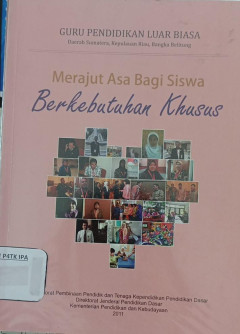
Merajut Asa Bagi Siswa Berkebutuhan Khusus
- Edition
- -
- ISBN/ISSN
- -
- Collation
- 73 hal
- Series Title
- -
- Call Number
- 371.9 DIR
- Edition
- -
- ISBN/ISSN
- -
- Collation
- 73 hal
- Series Title
- -
- Call Number
- 371.9 DIR

Pedoman Modis Pisan (Mobil Pendidikan Semua Pintar Sains)
- Edition
- -
- ISBN/ISSN
- -
- Collation
- 29cm X 21cm
- Series Title
- Pedoman
- Call Number
- 371.2PED
- Edition
- -
- ISBN/ISSN
- -
- Collation
- 29cm X 21cm
- Series Title
- Pedoman
- Call Number
- 371.2PED
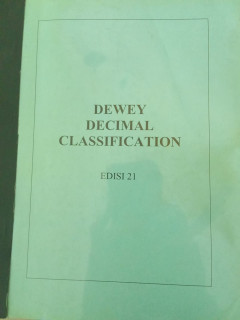
Dewey Decimal Classification
Buku Dewey Decimal Classification (DDC) merupakan panduan sistem klasifikasi perpustakaan yang digunakan secara internasional untuk mengelompokkan dan mengatur bahan pustaka berdasarkan subjek.
- Edition
- Edisi 21
- ISBN/ISSN
- -
- Collation
- 24 cm x 19,3 cm
- Series Title
- Katalog Edisi 21
- Call Number
- 025.431
 Computer Science, Information & General Works
Computer Science, Information & General Works  Philosophy & Psychology
Philosophy & Psychology  Religion
Religion  Social Sciences
Social Sciences  Language
Language  Pure Science
Pure Science  Applied Sciences
Applied Sciences  Art & Recreation
Art & Recreation  Literature
Literature  History & Geography
History & Geography